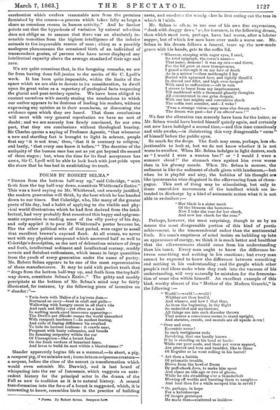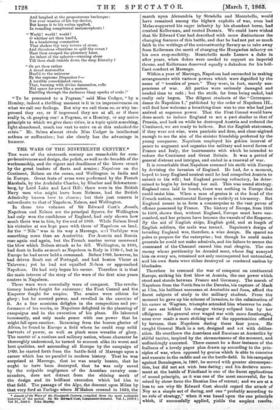POEMS BY ROBERT SELMA.* "DREGS from the bottom half-way up,"
said Coleridge, "with froth from the top half-way down, constitute Whitbread's Entire." This was a hard saying ou Mr. Whitbread, and scarcely justified, the modern generation will think, by the beer which he has handed down to our times. But Coleridge, who, like many of the greater poets of his day, had a habit of applying to the visible and phy- sical world illustrations which he had first derived from the intel- lectual, had very probably first conceived this happy and epigram- matic expression in reading some of the silly poetry of his day, and only applied it to poor Mr. Whitbread's porter because he, like the other political wits of that period, were eager to assail that excellent brewer's exposed flank. At all events, we never met with any physical compound which answered half so well to Coleridge's description, as the sort of deleterious mixture of dregs and froth, intellectual sediment and intellectual ecstasy, muddy reverie and flatulent enthusiasm, which issues in large quantities from the youth of every generation under the name of poetry. Mr. Robert Selma appears to be one of the most representative of these manufacturers. It may be said with perfect truth that "‘ dregs from the bottom half-way up, and froth from the tophalf- way down, constitute Selma's Entire." The gritty and muddy precipitate at the bottom of Mr. Selma's mind may be fairly illustrated, for instance, by the following piece of invective on
slander:"- "Twin-born with Malice of a lep'rons dam— Nurtured on envy—bred in craft and guile—
Wallowing with hungry snout in all that's vile And rank and filthy—yet often as a lamb
In melting meek-eyed innocence appearing—
The Devil's-pot Slander roams the world unscathed With rampant insolence !—In modest fearing, And coils of lisping diffidence 'tie swathed To hide its horrent foulness : it crawls near, Pregnant with hasty calumnies, and breeds
Its damning serpentry within the ear
Of Unsuspicion—like a locust feeds On the fresh verdure of luxuriant fame, And loves to build its nest within a blasted name !"
Slander apparently begins life as a mammal,—in short, a pig, a rampant pig, if we mistake not ; turns into an oviparous creature— a serpent, before the close of the sonnet (a transformation which would even astonish Mr. Darwin), and is last heard of whispering into the ear of Innocence, which suggests an ante- cedent history for the principal actor in the drama of the Fall as new to tradition as it is to natural history. A second transformation into the form of a locust is suggested, which, it is interesting to know, resembles birds in the practice of building
• Poem. By Robert Selma. Sampson Low.
nests, and emulates the woodp. cker in first eating out the tree in which it l Oda.
Mr. Selma is often, to use one of his own fine expressions, " dank with dreggy dews," as, for instance, in the following dream, than which most men, perhaps, have had worse, after a lobster supper, but of which few men have ever made a worse use. Mr. Selma in his dream follows a funeral, tears up the new-made grave with his hands, gets to the coffin lid,
" Whereon, stooping with eager eyes, I read,
Its total epigraph, the corse's name— That name, demons ! it was ?ay own—and there,
For the lid grew at once transpicuous, I gazed a-through it on my face of death As in a mirror !—then methought I lay Buried with upturned face, and tightly thrall'd In shroud and fillet, and high over-heaped With sand to suffocation :—oft in vain I strove to burst from my imprisonment, Till maddened with a thousand ghastly thoughts All concentrated in one grim despair, With one last mighty and convulsive shock The coffin rent asunder, and--I woke !
'Twas a strange vision—may none else dream such !— The dream was past—but 1 an altered man! "
We fear the alteration can scarcely have been for the better, or Mr. Selma would have buried himself quietly again, and certainly not now have indulged a second time,—and this time consciously and wide awake,—in disinterring this very disagreeable " corse" of himself before the public eyes.
So much for the dregs. The froth may seem, perhaps, less ob- jectionable to look at, but we do not know whether it is not worse to swallow. When Mr. Selma indulges in light desires, such as " I would I were a wanton bee !" or I would I were a summer cloud !" the stomach rises against him even worse than in his gloomy moods. When Mr. Selma is morose, the sediment is like the sediment of chalk given with laudanum,—but when he is playful and airy, the bubbles of his thought are like ipecacuanha wine disguised in the effervescing foam of cham- pagne. This sort of thing may be stimulating, but only to those convulsive movements of the intellect which are in- tended to discharge by a kind of automatic action what it is not able to assimilate;
" Her blush is a sister meek Of the blossom she bestows—
Now I take the rose for her cheek, And now her cheek for the rose."
Perhaps, however, the most surprising, though to us by no means the most disagreeable portion of this kind of poetic achievement, is the transcendental rather than the sentimental froth. If a man's emptiness of mind insists on bubbling up into an appearance of energy, we think it is much better and healthier that the effervescences should come from his understanding than his heart. Every man ought to know the difference be- tween something and nothing in his emotions; but every man cannot be expected to know the difference between something and nothing in his understanding ; and the gurgle which other people's real ideas make when they rush into the vacuum of his understanding, will very naturally be mistaken for the fermenta- tion of some idea within himself. An excellent example of this kind, worthy almost of the "Mother of the Modern Gracchi," is the following :-
"World !—world !—world !
Whither art thou hurl'd, And whence, and how ? that thus, As from the beginning, in thy flight So undecided and mysterious, All things are into such disorder thrown That scarce a conscience seems to stand upright, And statutes, creeds, and morals are all upside down: " Over and over, Eccentric rover !
In such vertiginous reels Revolving, that one hardly knows If ho is standing on his bead or heels : While our poor souls, and their yet worse apparel, Are pierced and torn and tumbled, like to those Of Regulus as he went rolling in his barrel!
" Art thou a bubble Of prismatic trouble, Blown from the bowl of Doom By puff-cheek Jove, to make him sport And chase an idle ago or two of gloom, While he sits straddling o'er a thunderbolt
Blowing off worlds and bursting them to naught—
And halt thou for a while escaped him in revolt ?
" Or, perhaps, in hope For a kaleidoscope Of images grotesque
He made thee—scattered us inside-
And laughed at the preposterous burlesque : Nor ever wearies of his toy-device, But keeps it to his retina applied, In rounding sempiternal metamorphosis !
" World ! world ! world !
0 whither art thou hued, In a headstrong commotion That shakes thy very towers of stone, And threatens oftentime to spill thy ocean ?
East thou escaped the planetary knee, An infant of the spheres—running alone Till thou shalt tumble down the deep Eternity ?
" Or art thou rather A dread maranatha Ilurrd to the universe By the supreme Dispositor ?— A terrible consolidated curse, That, burning with divine damnation, rolls Mid space for ever like a meteor, Emitting through the darkness blazy sparks of souls !"
" To be presented to a Pogram," said Miss Codger, " by a Hominy, indeed a thrilling moment is it in its impressiveness on what we call our feelings. But why we call them so, or why im- pressed they are, or if impressed they are at all, or if there really is, oh gasping one ! a Pogram, or a Hominy, or any active principle to which we give these titles, is a topic spirit-searching, light-abandoned, much too vast to enter on at this unlooked-for crisis." Mr. Selma almost rivals Miss Codger in intellectual asthma or suffocation ; but she clearly has the advantage in humour.



























































 Previous page
Previous page